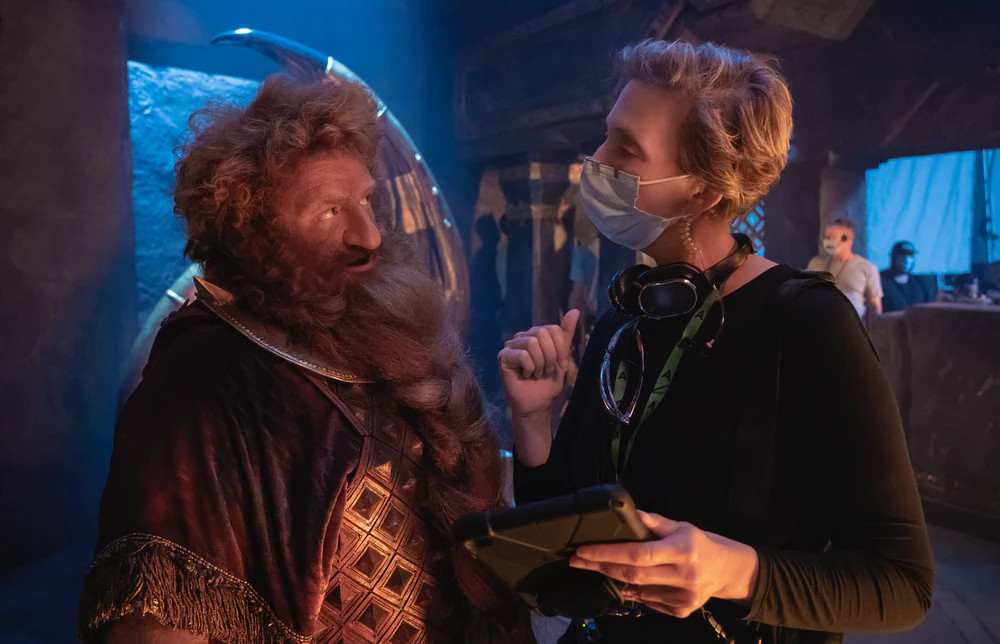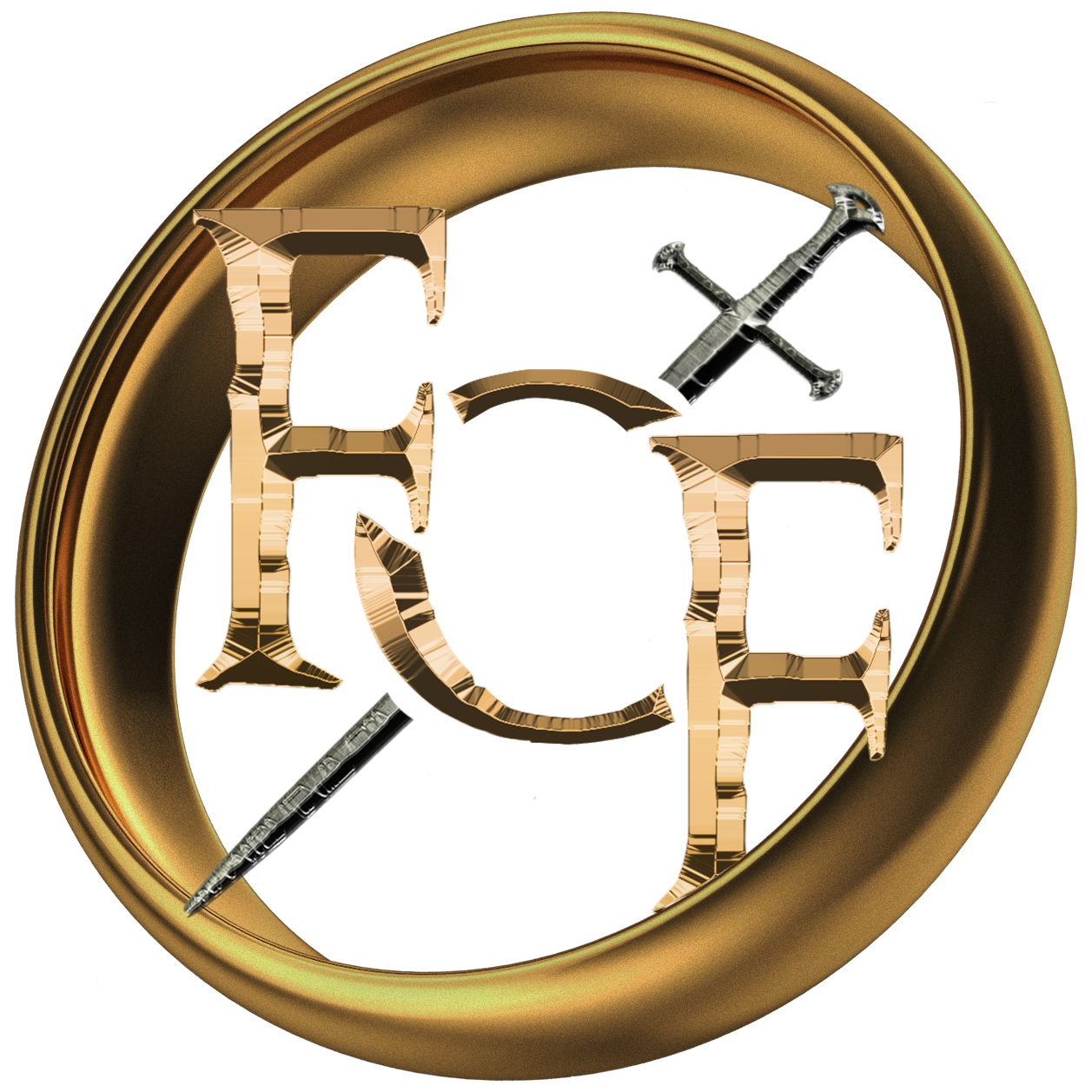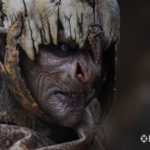
The Rings of Power Dialect Coach and a War of the Rohirrim Original Name
Dialect Coach Leith McPherson
Marketing for Amazon Studios’ The Rings of Power series finally seems to be picking up, but many mysteries remain. One long-standing mystery has been the identity of the linguist or linguists Amazon has been consulting for the show. As this is a show based on Tolkien’s writings, some of us expect to hear snatches of Quenya, Sindarin, Khuzdul, Adûnaic, or even the Black Speech. We also expect to see (and indeed have already seen) things written in Tengwar and Cirth. Tolkien’s invented languages are a small and highly specialized area of study, and most prominent scholars of Tolkien’s languages are familiar with each other. Hence the puzzlement among Tolkien linguists when it seemed no one claimed to be working on the show.
Recently we have received a bit of news which may perhaps shed some light on Amazon’s approach to Tolkienian linguistics, even if it doesn’t necessarily answer the question. This news has come in the form of an article on Inverse about dialect coach Leith McPherson, who has been working on the Amazon series. Leith McPherson was trained as a singer, is a graduate of the Voice Studies course at the Royal Central School of Speech and Drama in London, and has worked as a voice, acting, and dialect coach over the past 25 years. She currently lives in Australia. She has previously worked on Warner Bros. Hobbit trilogy, among many other projects.
Generally the work of a dialect coach is to help actors to deliver their lines effectively in a dialect (or even language) that is not their own. Following the conventions of Medieval historical and fantasy film and television, all the actors will apparently be speaking one or other of the various present-day dialects of the British Isles, even if they are from Australia or the United States. Further, some actors will need to speak lines in Sindarin, Khuzdul, or whatever. It is the dialect coach’s job to enable the actors to say their lines in these dialects and languages naturally, just as the fencing and riding instructors try to enable actors to appear as if they’ve been riding horses and swordfighting their whole lives.
What is usually not the job of the dialect coach is translating dialog into a non-English language, or coming up with character names. These would usually be the job of the linguistic consultant, or possibly the writers in the latter case. I presume that Amazon has also hired someone as a linguistic consultant. Likely this is someone familiar with Tolkien’s invented languages and scripts, who can be relied upon when special dialog or written artifacts are needed. Of course, the article makes no direct mention of such a person or people, but this is likely due either to journalistic bias (i.e., the subject of the interview is the most important person in the production) or to Amazon’s policy of keeping all details a secret until they decide to release them. I suppose it is also possible that Leith McPherson is the linguistic consultant, but I would think a production such as this would be able to hire both a dialog coach and a linguist, as Peter Jackson did for his films.
Either way, I suspect that Amazon has left a blind spot in the production: neither the dialect coach nor our hypothetical Tolkien linguist are necessarily philologists. That is to say, all may lack expertise in the historical development of languages, particularly those used by Tolkien (notably Old English, and to a lesser degree Old Norse, Gothic, and Medieval Welsh). Either that, or perhaps the linguist or linguists get overridden by the writing team when it comes to names.
Leith McPherson is familiar with Appendix E of The Lord of the Rings, as a Tolkien dialect coach ought to be. She did make several curious comments in the article which seem to differ from my understanding of Tolkien’s languages in the Second Age. First, she is paraphrased as saying that Quenya “is like ‘Elvish Latin’ in the Third Age but commonplace in the Second Age, when The Rings of Power takes place.” According to my understanding, Quenya had become a dead language (at least in public) by the Second Age. The other comment, again a paraphrase, is that the Elves use Quenya “for spellcasting”. This seems to be an odd description of Elven “magic”, more akin to Harry Potter or perhaps fantasy role-playing games than the secondary world Tolkien created. And even so, it was a Sindarin word that opened the Doors of Durin.
Perhaps the most notable news from the Inverse article is McPherson’s approach to dialects in The Rings of Power. She had previously worked on The Hobbit, which used dialects of English from the British Isles. The Rings of Power takes place thousands of years before The Hobbit, so presumably the dialects would have changed over time. (Of course, names and naming conventions would likely have changed also, but that’s a different can of worms.) McPherson wanted to avoid having any of the accents in the show sound too familiar to audiences, so instead of using easily identifiable dialects, she took a different approach:
But even the English in The Rings of Power won’t have accents familiar to audiences. While the use of English is a choice for accessibility, McPherson and the team are also striving to “make sure an accent doesn’t take [audiences] to their nana’s down the road.” For example: The Harfoots, ancestors to the Hobbits, appear in The Rings of Power with “an Irish base to their accent,” but they do not speak as though they’ve walked out of a “particular cross street in Dublin.”
“It’s familiar, but different,” she says. “It’s not like an entirely new dialect never heard on Earth before, but it is intended to have an otherness.”
It’s an interesting idea, among many interesting ideas that could potentially contribute to the success of The Rings of Power. There is also an element of risk, though, I believe. If there is too much otherness, the dialects could end up being too distracting for the audiences, let alone the actors who have to constantly speak in them. On the other hand, if there is not enough otherness, audiences will perceive the accents as simply “generic Irish” or whatever, without appreciating any of the foreignness.
Hera Helmsdaughter
Along with the increasing amount of publicity for The Rings of Power, Warner Bros. has seen fit to announce the major voice actors for their upcoming animated feature film, The War of the Rohirrim. See this article for details. Here I would just like to comment on the name of one the characters: Helm Hammerhand’s daughter.
Helm Hammerhand was a King of Rohan, after whom the narrow vale of refuge known as “Helm’s Deep” was named. The defensive structure itself is properly called the Hornburg, though before Helm’s time it was called Suthburg. In Tolkien’s writings Helm Hammerhand is known to have had a sister, Hild, and two sons, Haleth and Háma. He also had a daughter, who played a key role (albeit a rather passive one, as far as Tolkien recorded) in the outset of the aforementioned war, but she is unnamed. Well, the creators of The War of the Rohirrim have naturally decided to give her a name: Hera.
This name follows Rohirric naming conventions in some ways. It alliterates with the name of her father and her brothers, and like them it appears to be formed of a single element or root word. The issues with this name are that it is the well-known name of a Greek goddess (hence provoking a similar reaction to “Theo”), and that it appears (assuming it is a native Old English name) to be masculine in form. Tolkien may have “translated” his a‘s to o‘s when devising masculine Hobbit names, but he did no such thing with his Rohirric names. A number of Rohirrim have names that end in a, such as Háma, Brytta, Herefara, and so on. They are all males.
Of course, coming up with a suitable name for Helm’s daughter is not necessarily easy. Assuming her name must alliterate with that of her father, and should consist of a single root word (neither of which I feel must be strictly adhered to), the most likely feminine name by far would be Hild. But that is already the name of Helm’s sister. This leaves a number of less desirable options. Some (such as “Hleowth”) would likely be rejected due to difficulty of pronunciation. Others, because they are too familiar (“Help”). And many others because their meaning is unsatisfactory. I have found one word which seems suitable: hére (“dignity, majesty, greatness”). My guess is that the scriptwriters also encountered this same word, possibly felt it had too great a resemblance to the Modern English word “here”, or perhaps that it wasn’t clearly feminine enough, and changed the last letter to a. Tolkien created names that ended in wine where wine means “friend” rather than the Modern English word “wine”, so I don’t think the resemblance between Hére and “here” should be an issue. There is no immutable law of the universe that words ending in a are feminine. English is not a Romance language, but sometimes we act as if it should be one. (See also: Dísa in The Rings of Power) Sometimes I feel Tolkien’s work is far from done.




No Comments